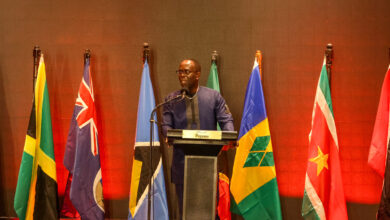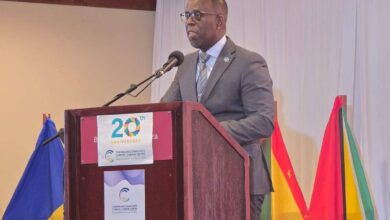A Special meeting of the Conference of Heads of Government of the Caribbean Community (CARICOM) took place in Barbados on 26th and 27th January, 1974 .
All the four Member States of the Community were represented: Barbados by the Rt. Hon. Errol Barrow, Prime Minister; Guyana by Hon. Forbes Burnham, Prime Minister; Jamaica by Hon Michael Manley, Prime Minister; and Trinidad and Tobago by Hon. George Chambers, Minister of Finance.
Other Ministers present were:
Barbados – Senator to Hon. Branford Taitt, Minister of Trade, Industry and Commerce
Guyana – Hon. S.S. Ramphal, Minister of Foreign Affairs and Justice
Hon. Frank Hope, Minister of Finance
Hon. George King, Minister of Trade
Jamaica – Hon. P.J. Patterson, Minister of Industry Trade and Tourism
Trinidad & Tobago – Hon. Errol Mahabir, Minister of Industry and Commerce
Hon. James Mitchell, Premier of St. Vincent and Chairman of the West Indies Associated States (WISA) Council of Ministers, was specially invited to attend to participate in the discussions of the Conference. Mr William Demas, Secretary-General of the Caribbean Community Secretariat, was also in attendance.
The Rt. Hon. Errol Barrow, Prime Minister of Barbados, was by acclamation elected Chairman of the Meeting.
The Meeting of Conference was immediately preceded on 25th January by a Meeting of Attorneys-General, convened to make recommendations to Conference concerning the procedures for the non-independent countries of CARIFTA to join the Caribbean Community. Delegation leaders at this meeting were
Senator the Hon. George Moe, Attorney-General and Minister of External Affairs, Barbados (Chairman)
Mr Duke Pollard of the Ministry of Foreign Affairs, Guyana
Senator Leacroft Robinson, Attorney-General, Jamaica
Mr Richard Crane of the Ministry of Legal Affairs, Trinidad and Tobago
Mr Carl Dundas, Legal Counsel, represented the Caribbean Community Secretariat.
Conference accepted the recommendations of the Attorneys-General, thus clearing the way for the entry of those non-independent countries of CARIFTA which were signatories to the Georgetown Accord of April, 1973 in to the Caribbean Community on 1st May, 1974.
Conference discussed the very severe impact of the world energy crisis on the balance of payments of the countries of the region and exchanged information on steps they had been taking at both national and international level to alleviate the impact of the crisis on their economies. Measures of national economic policy of both a defensive and positive nature to meet the situation where also reviewed.
Conference accepted the recommendation of a sub-committee of Ministers of Finance that the Governors of the Central Banks of member countries should meet shortly to recommend arrangements for regional monetary and payments co-operation to assist the countries of the Region in meeting the international crisis.
Conference decided to proceed most urgently with the formulation and implementation of co-ordinated regional and national production programmes in Agriculture and industry in an effort not only to meet the immediate crisis but also to assist in the long-term re-structuring and strengthening of the regional economies. A decision was made to summon urgently a Meeting of Ministers of Agriculture of the countries of the region to finalise a draft Emergency Agricultural Programme prepared by the Caribbean Community Secretariat with the assistance of regional technicians. Arrangements were also made to finalise and begin implementing a co-ordinated Industrial Development Programme for the countries of the Region.
With special reference to the Emergency Programme for Agriculture, Conference considered a Report prepared by a Group of Regional experts in 1973 dealing with the re-organisation of the Regional research centre (for Agriculture) at St. Augustine, U.W.I. with a view of enabling the Centre to play a more effective role in national and regional agriculture development programmes. Conference accepted the proposals of the Experts and Member Governments pledged their full financial support to the re-organised institution.
Important decisions were taken on regional transportation. Conference agreed in principle to the establishment of a Regional transportation Council of Ministers within the framework of the Caribbean Community to replace the Regional Shipping Council to co-ordinate all aspects of regional Transportation, including Shipping and Air Transport for Passengers and Freight; development of Transport infrastructure such as Ports and Airports; and negotiating machinery on freight rates proposed by extra-regional Shipping and Air Carriers. A decision was also taken to appoint a Working Party of regional Officials to submit proposals to Conference on Rationalisation of Air Transport facilities for passengers and freight both intra – and extra-regionally.
Conference also took final decisions on the conclusion of an Agreement between Mexico and the Caribbean Community on economic, technical and cultural co-operation. the Secretary-General was delegated to conclude the Agreement with the Foreign Minister of Mexico in March, 1974 at the Secretariat Headquarters in Georgetown.
In respect of Sugar the Heads of Government agreed to act in concert in the context of the economic crisis confronting the Region. It was fully recognised that, faced with a serious imminent threat-to their balance of payments position and with escalating costs of production, Caribbean countries needed most urgently to maximise their export earnings from sugar.
The price of £61 per ton for sugar under the Commonwealth Sugar Agreement agreed in 1971 was clearly no longer the reasonably remunerative price envisaged and indeed required by the Agreement.
In all the circumstances, it was agreed that Caribbean countries in a position to do so much immediately seek to enlarge their foreign exchange earnings by the sale of sugar in remunerative markets.
Meanwhile, with a view to maintaining supplies under the Commonwealth Sugar Agreement, an immediate and substantial upward revision of the NPQ price should again be requested and urgently pursued. It was emphasized that it was the firm desire of the Region to fulfil the 1974 supply commitments under the Commonwealth Sugar Agreement at remunerative and realistic prices.
The Heads of Government considered the troubled situation in Grenada; they expressed their concern over it and their hope for an early resolution of the problems at present affecting the State on a basis consistent with constitutional propriety and with respect for fundamental human rights; they looked forward to the day, when, in due course, Grenada will play its full part as an independent member State of the Caribbean Community.
Conference congratulated the Secretary-General on his appointment as President of the Caribbean Development Bank with effect from 22nd April, 1974 and expressed appreciation for his services to CARIFTA and the Caribbean Community and hoped that in his new post in the Bank he would continue to promote the cause of regional economic integration.
Conference ended with the acceptance by acclamation of a motion moved by Hon. Forbes Burnham, Prime Minister of Guyana, conveying Conference’s admiration for the able and effective manner in which the Chairman, the Rt. Hon. Errol Barrow, Prime Minister of Barbados, had chaired the Meeting and its appreciation of the efficiency and hard work of the supporting staff of the Barbados Government, and conveying the thanks of the visiting Delegations for the hospitality and warmth with which they had been received by the Government and people of Barbados.





